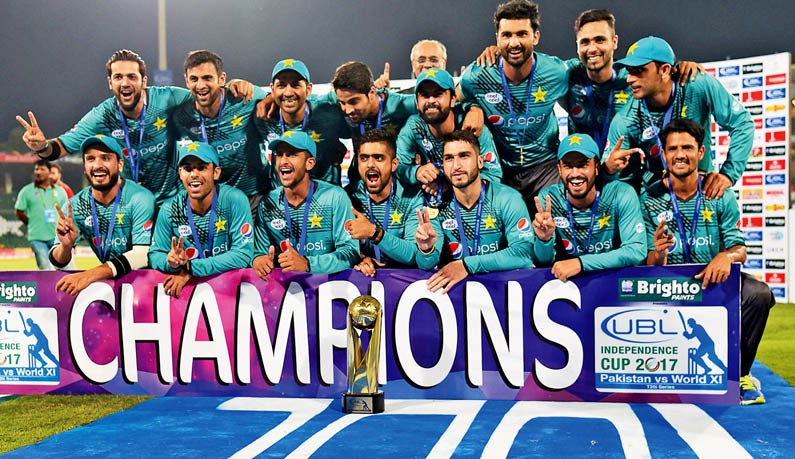
Pakistan is celebrating the successful hosting of the Independence Cup featuring a star-studded World XI. But there is still a long way to go before a top-flight team visits the country for a full bilateral series.

Less than 12 hours after Pakistan wrapped up their three-match Twenty20 series against the World XI with a 33-run win at the Gaddafi Stadium, top International Cricket Council (ICC) officials released their congratulatory messages over the successful hosting of the Independence Cup. ICC Director Giles Clarke, the man at the forefront of the campaign to bring international cricket to Pakistan, and ICC Chief Executive David Richardson "thanked the people of Pakistan for embracing the World XI players, stressing that the series demonstrated the country’s passion and love for cricket, as well as its ability to provide an environment in which international cricket stars can show their talent."
Clarke hoped that the World XI players will give a positive feedback on their return home adding that "we will see the return of bilateral international cricket to Pakistan."
Richardson was a bit more cautious though he expressed his satisfaction over the security arrangements that were made to ensure the successful hosting of the Independence Cup.
He rightly pointed out that the real goal behind the World XI’s visit to Pakistan was to "build confidence in the likes of the Australians, South Africans and other countries that the threat can be managed and this tour has shown that is the case."
Just hours before Friday night’s final game in Lahore, the Australians, who are scheduled to visit Pakistan next fall, made it clear to the Pakistan Cricket Board (PCB) and the ICC that the return of bilateral cricket remains a Herculean task.
"I don’t see in the short term that there are any plans for us to play in Pakistan," announced James Sutherland, Cricket Australia’s Chief Executive. That’s the message coming out of a country that last sent a cricket team to Pakistan almost 20 years ago.
That’s precisely the reason why Richardson has stressed that the return of full-time international cricket back to Pakistan is not going to be an overnight miracle.
"It has to take time. The PSL final was the first step, this is the second. We have now shown that events can be staged in one city over a short period of time in a Twenty20 format. Now, the next steps have to be taken, meaning can they be rolled out in more than one city over a longer period of time. Probably the next step would be a tour by a Full Member country as opposed to a composite team," he said.
Meanwhile, Najam Sethi, the PCB chairman, is confident that such a tour could happen as early as next year. But that could be a case of wishful thinking.
To have three Twenty20 games squeezed within four days at one single, heavily fortified venue is one thing. To have a full tour consisting of say, three Tests, five One-day Internationals and a couple of T20 games is another.
But Pakistan has to somehow get to that goal, sooner rather than later. And the ICC can help. Pakistan’s cricket fans are certainly grateful to the international cricket body over its much-needed support for the World XI visit but that should just be the beginning. ICC will have to do more. For years it has sat and watched Pakistan cricket’s decline post 2009. For years, it allowed the Indian cricket board (BCCI) to dictate terms. It is no secret that the likes of N. Srinivasan, the former ICC chief, pushed their own agendas and among other things damaged the interests of Pakistan cricket without facing any worthwhile opposition.
Thankfully, those dark days are now a story of the past. The ICC today appears to be a body that is not entirely controlled by one country’s cricket board. It is good news for countries like Pakistan, who are in desperate need of support from the international cricketing community. Following several lean years, the PCB was left with drained finances. The Board has replenished some of its accounts after receiving its shares from the ICC following World Cup 2015, World Twenty20 2016 and Champions Trophy 2017 but it is still not in the safe zone. The Board reportedly spent 3 million dollars for the brief series featuring Pakistan and the World XI. Imagine the cost of a full home series against a visiting Test-playing nation. The sort of security measures taken in Lahore were unprecedented. They will need to be repeated whenever Pakistan hosts international games at venues like Lahore, Karachi or Rawalpindi. It is going to cost a lot more than 3 million dollars.
The ICC can help here by playing a role in resolving PCB’s dispute with BCCI. The Indians agreed to play bilateral matches against Pakistan but didn’t honour their commitment. Pakistan have lost hundreds of millions of dollars because of India’s refusal to play bilateral matches. The PCB is now preparing to sue BCCI in the hope to receive ample compensation.
Meanwhile, Pakistanis are celebrating the successful hosting of the Independence Cup. But they still have a long to go before a top-flight team visits the country for a full bilateral series. It can happen provided bodies like the ICC continue supporting the campaign for the full-time return of international cricket to Pakistan.